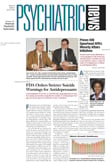APA joined with several new partners at its annual Academic Consortium meeting in Washington, D.C., last month to advocate with one voice for increased federal funding of psychiatric and addictions research.
APA Medical Director James H. Scully Jr., M.D., told Psychiatric News, “We are working to increase our efforts on behalf of psychiatric research by expanding the consortium to include organizations of leading researchers.”
He continued, “Working together we can be more effective in advocating for the critically important need to support the research that has been so successful and holds such promise for improving the lives of our patients.”
APA partnered with the American Academy of Child and Adolescent Psychiatry, National Alliance for the Mentally Ill (NAMI), American Association of Chairs of Departments of Psychiatry (AACDP), American College of Neuropsychopharmacology, Depression and Bipolar Support Alliance, and Society of Biological Psychiatry.
APA Praised
Representatives from these organizations who spoke to the consortium praised APA’s decision to broaden the consortium.
Joel Silverman, M.D., who represented the AACDP, said at the consortium’s meeting that academic departments of psychiatry are struggling to keep researchers due to a significant decline in research grants.
“We have almost dropped to the funding levels of the 1980s.” said Silverman, chair of the department of psychiatry at Virginia Commonwealth University’s School of Medicine.
“One glimmer of hope is an amendment by Sen. Arlen Specter [R-Pa.] to the Senate Budget Resolution for Fiscal 2005 approved by the Senate last month,” said Silverman. The measure calls for a 7.6 percent increase over last fiscal year in the budget of the National Institutes of Health (NIH). This would add another $1.3 billion to President Bush’s requested $764 million increase for NIH in Fiscal 2005, according to APA’s Department of Government Relations (DGR).
Mental Illness Research Underfunded
Raymond DePaulo, M.D., the Henry Phipps professor and chair of psychiatry and behavioral sciences at Johns Hopkins University, mentioned that federal research on mental illness, including substance abuse, continues to be underfunded compared with other medical illnesses like diabetes or cancer.
President Bush requested only a 2.6 percent over last year’s budget in the Fiscal 2005 budget proposal for the National Institute of Mental Health (NIMH) and the National Institute on Alcohol Abuse and Alcoholism. He requested a 2.8 percent increase over last year for the National Institute on Drug Abuse.
DePaulo was optimistic that funding will increase for research on depression and other mental illnesses much as it has for cancer. “Depression and other psychiatric illnesses are misunderstood and underfunded in the way cancer research was in the late 1960s. There was a stigma about cancer, a lot of misinformation, and only a few poorly understood treatments.”
DePaulo continued, “With the development of molecular biology, scientists have learned about the very nature of cancer, and now we have several distinct cancer-fighting strategies besides surgery. At Johns Hopkins, we have gone from four cancer specialists in 1968 to several hundred on the faculty today.”
Brain Disease Findings Expected
DePaulo predicted the next big story in biomedicine will be that of brain diseases, including the most severe psychiatric illnesses. “Over the next 33 years, we can change the course of psychiatric illnesses as we did with cancer since we declared war on it in 1971,” he said.
Progress will be driven by advances in genetics, brain imaging, and the molecular biology of brain mechanisms. “Investment in these basic sciences is the first step. It is important for enthusiasts and critics alike to realize that the translation of the molecular discoveries into effective treatment strategies for the psychiatric illnesses will take a concerted effort and time,” De Paulo said.
APA and its consortium partners support a 10 percent increase in the NIH budget to continue promising research and transform findings into treatment, according to DGR. APA and most of its consortium partners also support a 10 percent increase for the federal institutes for research on mental illness, including addictive disorders.
NAMI would like to see the NIMH budget increased by 12 percent in Fiscal 2005 and by $1 billion over a five-year period, said Laura Lee Hall, director of NAMI’s Policy Research Institute, at the consortium meeting. That and other recommendations are in a new report by NAMI released in February (see
page 18). ▪
